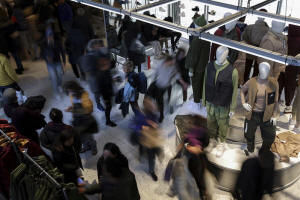US businesses brace for Trump's tariffs on Canada, Mexico and China to
drive up costs
 Send a link to a friend
Send a link to a friend
 [February 03, 2025] By
PAUL WISEMAN [February 03, 2025] By
PAUL WISEMAN
WASHINGTON (AP) — From an ice cream parlor in California to a medical
supply business in North Carolina to a T-shirt vendor outside Detroit,
U.S. businesses are bracing to take a hit from the taxes President
Donald Trump imposed Saturday on imports from Canada, Mexico and China —
America’s three biggest trading partners.
The levies of 25% on Canadian and Mexican and 10% on Chinese goods will
take effect Tuesday. Canadian energy, including oil, natural gas and
electricity, will be taxed at a lower 10% rate.
Mexico’s president immediately ordered retaliatory tariffs and Canada’s
prime minister said the country would put matching 25% tariffs on up to
$155 billion in U.S. imports.
China’s Ministry of Foreign Affairs said the country’s government firmly
opposes the move and will take "necessary countermeasures to defend its
legitimate rights and interests.” The Ministry of Commerce in China said
it would file a lawsuit with the World Trade Organization for the
“wrongful practices of the U.S.”
The Budget Lab at Yale University estimates Trump's tariffs would cost
the average American household $1,000 to $1,200 in annual purchasing
power.
Gregory Daco, chief economist at the tax and consulting firm EY,
calculates the tariffs would increase inflation, which was running at a
2.9% annual rate in December, by 0.4 percentage points this year. Daco
also projects the U.S. economy, which grew 2.8% last year, would fall by
1.5% this year and 2.1% in 2026 “as higher import costs dampen consumer
spending and business investment.’’

The Penny Ice Creamery in Santa Cruz, California, has had to hike prices
of its ice cream, including popular flavors “strawberry pink
peppercorn’’ and “chocolate caramel sea salt,’’ repeatedly in recent
years as an inflationary surge increased the cost of its supplies.
“I feel bad about always having to raise prices,’’ co-owner Zach Davis
said. “We were looking forward to inflation coming down, the economy
stabilizing in 2025 ... Now with the tariffs, we may be back at it
again.’’
Trump tariffs, Davis said, threaten to drive up the cost of the mostly
made-in-China refrigerators, freezers and blenders he’ll need if Penny
Ice Creamery goes ahead with plans to add to its six shops. He still has
painful memories of the extra equipment costs the company had to absorb
when Trump slapped massive tariffs on China during his first term.
The new tariffs will also raise the price of a customer favorite —
sprinkles — which Penny Ice Creamery imports from a company in Whitby,
Ontario. Tacking a 25% import tax on even something as small as that can
damage a small business like his.
“The margins are so slim,’’ he said. “Being able to offer that add-on
can maybe generate an additional 10 cents in profit per scoop. If a
tariff wipes that out, that can really be the difference between being
profitable and being break-even and even being underwater by the end of
the year.’’
In Asheville, North Carolina, Casey Hite, CEO of Aeroflow Health,
expects to take a hit because his company gets more than half its
supplies, including breast pumps, from Chinese manufacturers, providing
them to American patients through insurance plans. Aeroflow Health gets
paid by insurers at pre-negotiated rates, put in place before Trump
decided on his tariffs.
Hite said the tax on Chinese imports would hit the company’s finances,
forcing it either to purchase cheaper and lower-quality products or pass
higher costs along via higher health insurance premiums. Those might
take two years to materialize, Hite said, but eventually they would hit
consumers’ budgets.
“It will impact the patients,” Hite said. “In time, patients pay more
for the products.”
Even the made-in-USA absorbent incontinence pads Aeroflow Health buys
aren’t safe from Trump’s import taxes. They may include pulp from tariff
target Canada and plastics and packaging from China, according to the
Aeroflow Health, which warns of “turbulences” from the tariffs.
“Is this going to affect our business? You bet it is,’’ said Linda
Schlesinger-Wagner, who owns skinnytees, a women’s apparel company in
Birmingham, Michigan, north of Detroit, that imports clothing from
China. She said the 10% tax would increase her costs, though she plans
to absorb the extra expense instead of passing it along to customers.
[to top of second column] |

People shop at a retail store on Black Friday, Nov. 25, 2022, in New
York. (AP Photo/Julia Nikhinson, File)
 “I don’t like what’s going on,’’ she
said, referring to the broader impact of the tariffs. “And I think
people are going to be truly shocked at the pricing they’re going to
see on the cars, on the lumber, on the clothes, on the food. This is
going to be a mess.’’
William Reinsch, a former U.S. trade official now
with the Center for Strategic and International Studies, said that
many companies that stocked up on imported goods ahead of time to
avoid the tariffs. They will be able to draw on their piled-up
inventories for weeks or a couple of months, delaying their
customers’ pain.
George Carrillo, CEO of the Hispanic Construction Council, an
industry advocacy group, said construction companies have been
hoarding materials in anticipation of Trump’s actions, but he
worries about the possibility of inflation spiking in three to six
months.
“Once that inventory starts to get low, we’re going to start feeling
the effects,” Carillo said in a phone interview Saturday, ahead of
the announcement. “Developers and general contractors need to keep
up with the pace and they’re going to start buying more products and
it’s going to be at a higher price point.”
All that will be exacerbated by an emerging immigration crackdown
that is already spooking the construction industry’s labor pool, he
said.
“You put tariffs and you put workforce instability, it’s going to
create major delays in projects. It’s going to create an increase in
prices because of the lack of availability,” Carrillo said.
Then there are the industries that don't have the luxury of
stockpiling, including supermarkets whose farm products will spoil.
So the tariff impact will show up on grocery shelves within days.
“You don’t stockpile avocados,’’ Reinsch said. “You don’t stockpile
cut flowers. You don’t stockpile bananas.’’
In the tomato trading hub of Nogales, Arizona, produce vendor Rod
Sbragia, who followed his father into the business nearly four
decades ago, worries that the import levies will force some
distribution companies out of business and “would be detrimental to
the American consumer, to the choices they have at the supermarket.”
Sbragia voted for Trump in the past three elections and calls
himself a “staunch Republican.” The president, he said, must not
have been properly advised on the matter.
“When we’re worried about cost to consumers, inflationary pressures
and the overall health of our population,’’ he asked, “why are we
going to make it more difficult to get access to fresh fruits and
vegetables?”
American farmers are also likely to get caught in Trump’s trade
tussle with Canada, China and Mexico. The president’s supporters in
rural America make a tempting target for retaliatory tariffs. That
is what happened in Trump’s first term when other countries, notably
China, slapped back against the president’s tariffs with levies of
their own on things like soybeans and pork. In response, Trump spent
billions in taxpayer money to compensate them for lost sales and
lower prices.

Many farmers are now counting on the president to come through and
protect them from reprisals.
“The Trump administration provided a safety net,” said former
tobacco grower Lee Wicker, deputy director of the North Carolina
Growers Association, a collection of 700 farms that lawfully brings
in foreign temporary laborers to work the fields through a federal
visa program. Many of the association's farmers “trust him that he’s
going to take care of anybody who’s hurt by the tariffs, and that’s
really all that we can ask for.”
___
Associated Press staff writers Mae Anderson and Cedar Attanasio in
New York; Mike Householder in Birmingham, Michigan; Gary Robertson
in Raleigh, North Carolina; Gabriel Sandoval in Phoenix; and Didi
Tang and Christopher Rugaber in Washington, D.C., contributed to
this story.
All contents © copyright 2025 Associated Press. All rights reserved |